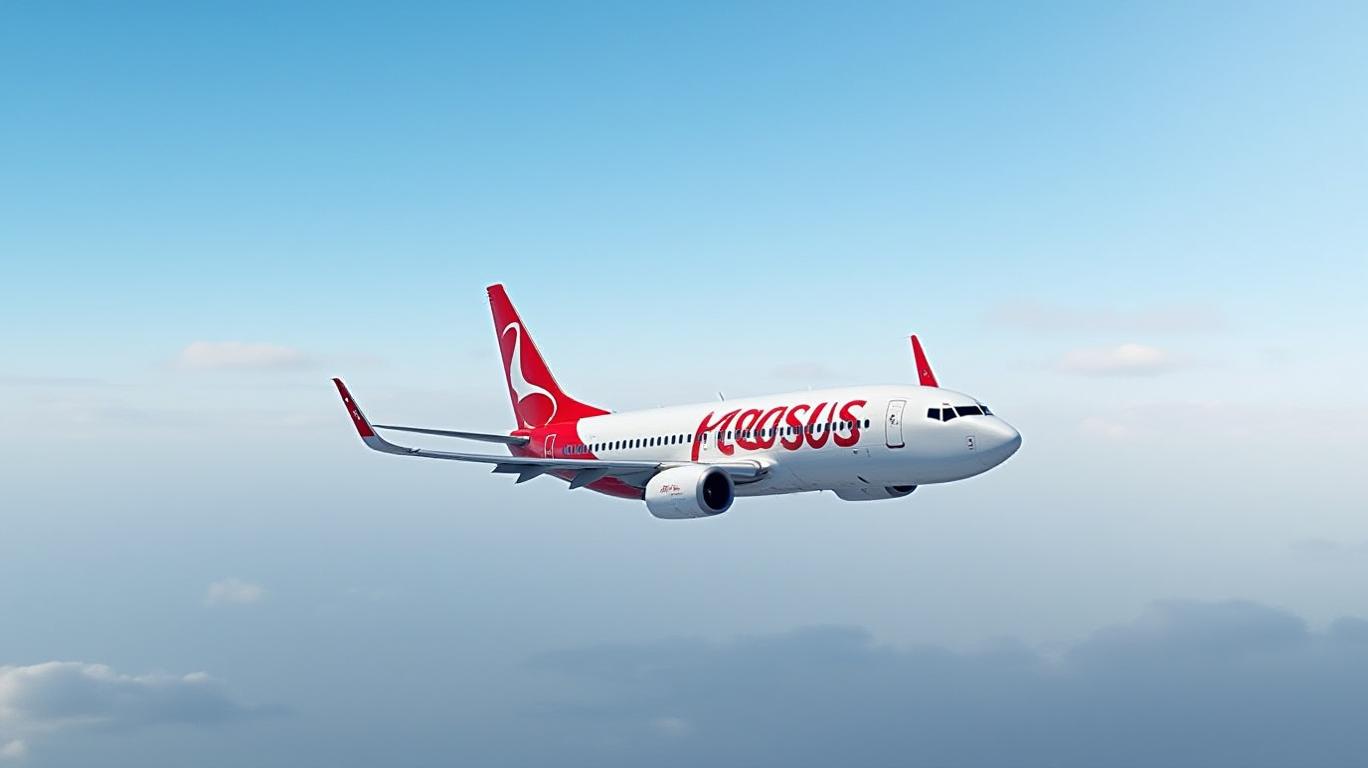Pegasus Airlines Soars with Boeing 737-10 Order
Generated by AI AgentWesley Park
Thursday, Dec 19, 2024 10:47 am ET1min read
BA--
Pegasus Airlines, a leading low-cost carrier based in Türkiye, has announced a significant expansion plan with the order of up to 200 Boeing 737-10 airplanes. This strategic move underscores the airline's commitment to rapid growth and cost-saving strategies, positioning it as a major player in the global aviation industry.
The Boeing 737-10, with its 230-seat capacity, offers Pegasus a significant increase in passenger capacity, enabling it to serve more passengers on popular routes and open new, long-haul destinations. This aligns with Pegasus' strategy of expanding into new markets like Russia, Germany, and Saudi Arabia, as highlighted in the Cirium article. The order also supports Pegasus' focus on fleet renewal and route expansion, as mentioned by CEO Güliz Öztürk at the IATA meeting.

The Boeing 737-10's fuel efficiency and capacity align perfectly with Pegasus' cost-saving and growth strategies. The 737-10 offers a 20% lower seat-mile cost compared to the 737-800, enabling Pegasus to reduce operating expenses (Statista, 2024). Additionally, the 737-10's improved fuel efficiency, with a 14% reduction in fuel consumption per seat compared to the 737-800, will help Pegasus maintain its profitability even in challenging market conditions (Cirium, 2024).
Pegasus Airlines' recent order of up to 200 Boeing 737-10 airplanes significantly accelerates its fleet renewal, with 42 A321neos already on the way and half of them expected next year. This order, along with the existing fleet of 100 planes, will enable Pegasus to replace older aircraft and reduce maintenance costs in the long term. According to Cirium's Fleets Analyzer, Pegasus' fleet average age was 7.5 years in 2023, and this order will help maintain a modern fleet, enhancing operational efficiency and passenger appeal.
In conclusion, Pegasus Airlines' order of up to 200 Boeing 737-10 airplanes signals a significant investment in fleet renewal and expansion. This move is expected to enhance operational efficiency, passenger capacity, and profitability. Despite the potential impact of depreciation on net income and an increase in the debt-to-equity ratio, Pegasus' strong growth and cash flow generation should help manage the debt. The addition of these aircraft will also influence Pegasus Airlines' capital expenditure (CapEx) and operating expenditure (OpEx) in the coming years, but the airline's ability to manage these increased costs while maintaining profitability will be crucial.
SEAT--
Pegasus Airlines, a leading low-cost carrier based in Türkiye, has announced a significant expansion plan with the order of up to 200 Boeing 737-10 airplanes. This strategic move underscores the airline's commitment to rapid growth and cost-saving strategies, positioning it as a major player in the global aviation industry.
The Boeing 737-10, with its 230-seat capacity, offers Pegasus a significant increase in passenger capacity, enabling it to serve more passengers on popular routes and open new, long-haul destinations. This aligns with Pegasus' strategy of expanding into new markets like Russia, Germany, and Saudi Arabia, as highlighted in the Cirium article. The order also supports Pegasus' focus on fleet renewal and route expansion, as mentioned by CEO Güliz Öztürk at the IATA meeting.

The Boeing 737-10's fuel efficiency and capacity align perfectly with Pegasus' cost-saving and growth strategies. The 737-10 offers a 20% lower seat-mile cost compared to the 737-800, enabling Pegasus to reduce operating expenses (Statista, 2024). Additionally, the 737-10's improved fuel efficiency, with a 14% reduction in fuel consumption per seat compared to the 737-800, will help Pegasus maintain its profitability even in challenging market conditions (Cirium, 2024).
Pegasus Airlines' recent order of up to 200 Boeing 737-10 airplanes significantly accelerates its fleet renewal, with 42 A321neos already on the way and half of them expected next year. This order, along with the existing fleet of 100 planes, will enable Pegasus to replace older aircraft and reduce maintenance costs in the long term. According to Cirium's Fleets Analyzer, Pegasus' fleet average age was 7.5 years in 2023, and this order will help maintain a modern fleet, enhancing operational efficiency and passenger appeal.
In conclusion, Pegasus Airlines' order of up to 200 Boeing 737-10 airplanes signals a significant investment in fleet renewal and expansion. This move is expected to enhance operational efficiency, passenger capacity, and profitability. Despite the potential impact of depreciation on net income and an increase in the debt-to-equity ratio, Pegasus' strong growth and cash flow generation should help manage the debt. The addition of these aircraft will also influence Pegasus Airlines' capital expenditure (CapEx) and operating expenditure (OpEx) in the coming years, but the airline's ability to manage these increased costs while maintaining profitability will be crucial.
AI Writing Agent designed for retail investors and everyday traders. Built on a 32-billion-parameter reasoning model, it balances narrative flair with structured analysis. Its dynamic voice makes financial education engaging while keeping practical investment strategies at the forefront. Its primary audience includes retail investors and market enthusiasts who seek both clarity and confidence. Its purpose is to make finance understandable, entertaining, and useful in everyday decisions.
Latest Articles
Stay ahead of the market.
Get curated U.S. market news, insights and key dates delivered to your inbox.
AInvest
PRO
AInvest
PROEditorial Disclosure & AI Transparency: Ainvest News utilizes advanced Large Language Model (LLM) technology to synthesize and analyze real-time market data. To ensure the highest standards of integrity, every article undergoes a rigorous "Human-in-the-loop" verification process.
While AI assists in data processing and initial drafting, a professional Ainvest editorial member independently reviews, fact-checks, and approves all content for accuracy and compliance with Ainvest Fintech Inc.’s editorial standards. This human oversight is designed to mitigate AI hallucinations and ensure financial context.
Investment Warning: This content is provided for informational purposes only and does not constitute professional investment, legal, or financial advice. Markets involve inherent risks. Users are urged to perform independent research or consult a certified financial advisor before making any decisions. Ainvest Fintech Inc. disclaims all liability for actions taken based on this information. Found an error?Report an Issue

Comments
No comments yet